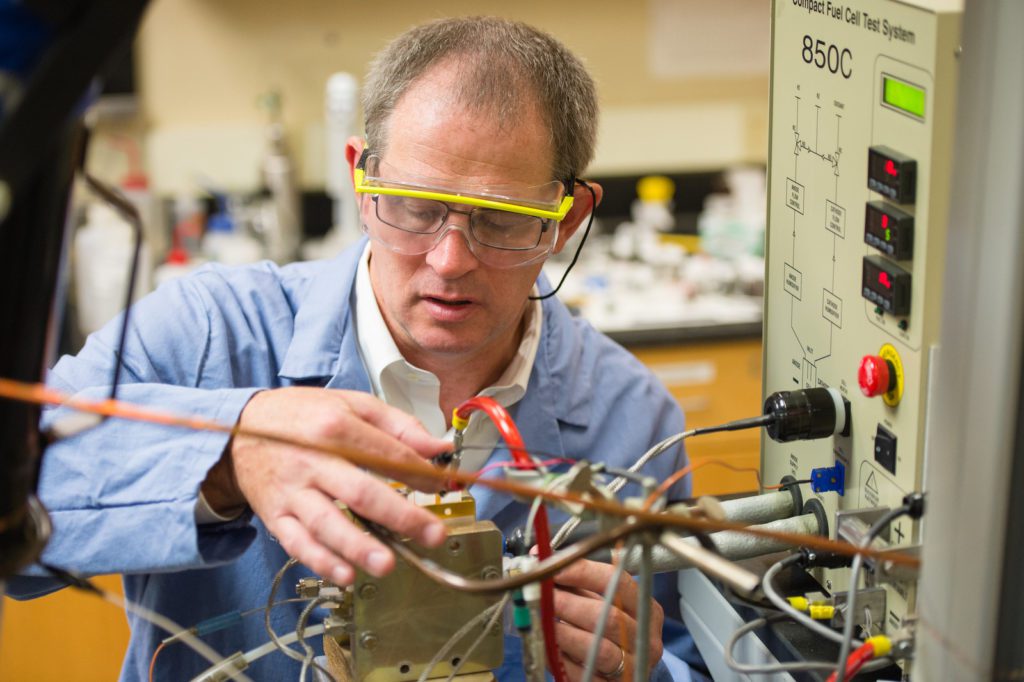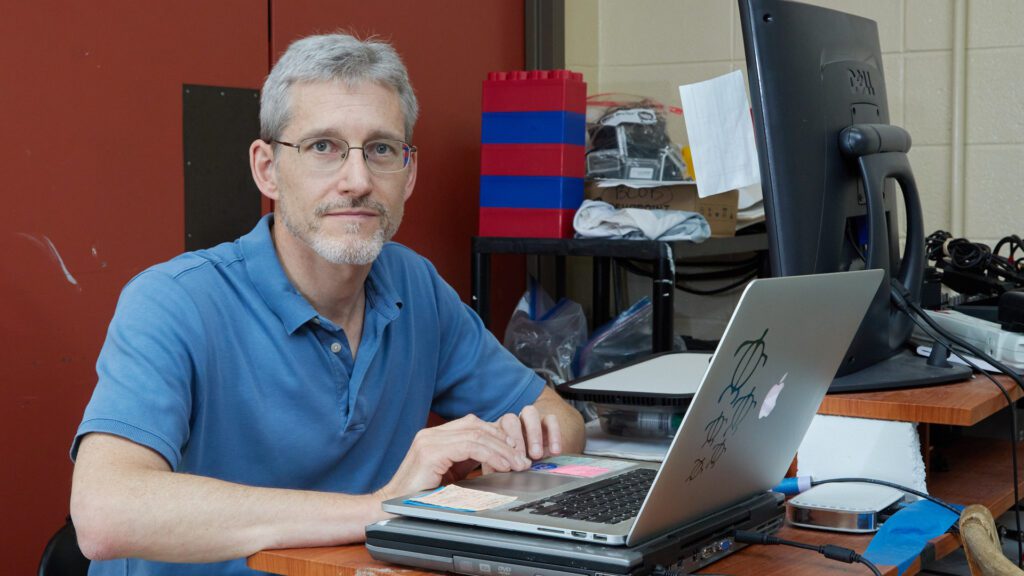Two professors in the Clemson University College of Science have been elected as 2024 Fellows of the Association for the Advancement of Science, the world’s largest general scientific society and publisher of the Science family of journals.
Stephen Creager, associate dean and a professor in the Department of Chemistry, and Richard Blob, Alumni Distinguished Professor in the Department of Biological Sciences, were among the 471 scientists, engineers and innovators who received the lifetime honor on March 27 in recognition of their outstanding achievements and contributions in the scientific community.
“Dr. Steve Creager and Dr. Rick Blob have led pioneering research programs at the frontiers of science. I congratulate them on being elected fellows of AAAS, which reflects national recognition of their leadership in the advancement of science,” said Cynthia Young, dean of the College of Science. “I thank them for their sustained excellence in both scientific discovery and in preparing the next generation of leading scientists. They both continue to elevate Clemson in many ways.”
Creager and Blob join seven other Clemson University faculty members who are current AAAS Fellows, according to a listing on the society’s website.
Learn more about Clemson’s 2024 AAAS Fellows:

Stephen Creager
Creager is being honored for his distinguished contributions in the characterization of self-assembled monolayers on electrode surfaces and their effects on electron-transfer processes.
“What drives me as a scientist is wanting to know how the world works,” Creager said. “There’s a curiosity there because I like to know how things work. It’s a complex world and there’s always new things to learn. That’s what makes science so cool, that you’re learning in a deeper and deeper way how the world works.”
Creager led an academic research group focusing on interfacial electron transfer and materials for electrochemical energy conversion and storage, including fuel cells, electrolysis cells and lithium batteries. His most recent research focused on ion transmission through two-dimensional materials such as graphene, which could be important for improving the efficiency of hydrogen fuel cells and purifying and desalinating water.
He earned his bachelor’s degree in chemistry from Rensselaer Polytechnic Institute and his Ph.D. in analytical chemistry from the University of North Carolina. After completing postdoctoral training at the University of Texas, he served as an assistant professor at Indiana University for six years.
Creager came to Clemson in 1995. During his time at Clemson, he served as interim associate dean of the graduate school and was chair of the chemistry department for six years.
During his career, he has published more than 150 scientific papers and advised 21 doctoral students and 10 master’s students.
As the College of Science’s associate dean, Creager has responsibility for research / discovery, graduate education, faculty affairs and academic space. In that position, he has had a large impact on academic research development and graduate education at Clemson, now designated a R1 institution for its comprehensive research program.
“I’m proud that during my career I contributed some new knowledge to understanding the way electrons are transferred, and I’m very proud of the students who earned their degrees under my direction. I’m proud of their accomplishments, and I’m glad I was able to help them realize their goals in life.”

Richard Blob
Blob’s selection as an AAAS Fellow recognizes his scientific contributions to the understanding of biomechanics and how relationships between organismal form and function have influenced macroevolutionary patterns of biodiversity, particularly through studies of major evolutionary transformations in animals.
“It’s really an honor and it is definitely shared with the people I’ve been fortunate enough to work with over the years,” Blob said. “It reflects how those interactions contribute to successful science and, to be very honest, to being happy while doing it. It can be hard to keep a sense of excitement and wonder about what you’re doing. When it can be sustained, it’s reflected in the research we produce. It’s also gratifying for the value of the field we work in to be recognized. It reinforces that research focused on basic science is important.”
Broadly, Blob’s lab is interested in the way animals use their muscles and skeletons to perform tasks that help them to survive, how that enables some groups to thrive under different conditions and what that means for the overall patterns of biodiversity that have emerged through the history of life.
Most of his research examines vertebrate muscle and bone function during locomotion, with a major focus on reptiles (especially turtles, alligators and lizards), amphibians and fishes. He has also studied fish feeding, vertebrate paleontology, and the mechanics and evolution of deer antlers.
Blob has been studying waterfall-climbing goby fishes, some of which use their mouths to climb. The research could help explain how structures used for a specific behavior can evolve new roles — and help humans develop better suction cups.
Blob earned a bachelor’s degree in paleobiology from the University of Pennsylvania. He then attended the University of Chicago, where he earned his master’s and Ph.D. in evolutionary biology before completing an NIH postdoctoral fellowship in the Department of Zoology at the Field Museum of Natural History in Chicago.
Blob joined the Clemson faculty in 2002. He has published more than 120 scientific papers and advised 12 doctoral students and 7 master’s students.
Blob has served as editor-in-chief of the journal Integrative Organismal Biology and, in February, took office as president-elect for the Society for Integrative and Comparative Biology.
Get in touch and we will connect you with the author or another expert.
Or email us at news@clemson.edu

